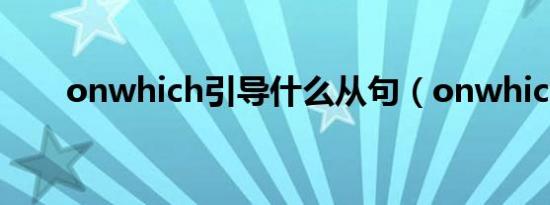
宾语从句是名词性从句的一种,用来冒充宾语的句子叫做宾语从句。如:He asked what you were doing last night. 他问你昨日晚上在干什么。
在宾语从句中须细致:
1. that 在白话中常被节略,但在正式的体裁中,不行省;而且它一样平常不行启发介词的宾语从句,但可启发except, but, in 等极少介词的宾语从句。如:
I didn’t know (that) he was Li Lei. 我不知道他便是李蕾。
I will do anything I can to help you except that I’m ill. 只有我身材惬意,我愿做任何事故来帮助你。
2. 宾语从句之后带有补足语身分时,通常须用it作表面宾语,把宾语从句放到句末,此时的that不行省。如:
The boy has made it clear that they can’t play with his toys. 阿谁男孩已明晰的评释他们不行捉弄他的玩具。
3. 动词advise, ask, demand, desire, insist(坚持见解), order, propose, request, suggest(推荐)等代的宾语从句须用虚拟语气,即:(should) do的式子。
He asked that we (should) get there before nine o’clock. 他要求我们在九点钟以前赶到何处。
The teacher advised us that we (should) not waste our time. 教师奉劝我们不要浪费时间了。
4. 宾语从句的时态与主句的时态须呼应。即:
1)当主句谓语动词的时态是目前时或改日时,从句的谓语动词可用任何所必要的时态默示。如:
He always says that he is our good friend. 他总是说他是我们的好朋友。
When the teacher knows what we have done, he will say that we have done a good deed. 当教师知道我们所干的事务时,他会说我们做了一件功德。
2)当主句谓语动词的时态为过去时,从句的谓语动词须用反映的过去时。如:
He didn’t tell us he came from Shanghai. 他没有通知我们他来自上海。
He said he had read the book. 他说他读过这本书。
3)但当从句的内容是客观真理或客观事实,而不受时间的制约时,尽管主句谓语动词为过去时,从句仍用普通现在时。如:
Chairman Mao said that all the imperialists are paper tigers. 毛主席说一共帝国主义者都是纸老虎。
When we were children, we were told that China is in the east of the world. 我们还是小孩子的时刻,人们就通知我们说中国在世界的东方。
宾语从句能够分为三类
(1)动词的宾语从句
1.1 大多数位于动词后背
Eg:I hope you can join us in the game.
1.2 有些是“动词+副词”后
Find out / point out / figure out / turn out/ figure out
Eg:Can you figure out what the poet really means in this poem?
1.3 有些动词短语背面
Make sure / make up one’s mind / keep in mind
Eg:we should keep in mind that sports can be a great boost to our health.
(2) it 作格式方式宾语庖代宾语从句
第一类动词: find/ feel/ think/ consider/ make / believe/ guess/ suppose /assume等背面有宾语不够语时,需求用it 作形势宾语而将that启发的真实的宾语从句后置。
Eg:I think it necessary that we do some sporting.
第二类动词: 带宾语从句时必要在从句前方加it。这类词:hate / like/ dislike/ appreciate/ depend on/ see to /
Eg: I hate it when they talk without considering other’s feeling.
不过若是宾语从句是WH-类向导的,厥后面有to be 短语作宾语补足语,不可以用it 替代。
We all consider what you said to be unbelievable. (right)
We all consider it to be unbelievable what you said .(wrong)
(3) 形容词后的宾语从句
Adj: sure / certain/ glad/ pleased/ happy / afraid / sorry 等等。
Eg:I am not sure whether you will come or not.
3. 宾语从句的语序问题
(1)要把疑难口气改成述说口气
Eg:I could not understand why you refused this good opportunity.
(2) 宾语从句启发词that 的简略节略问题
That在凡是情况下能够简略节略,但在一下情况下不能够简略节略。
a.一个动词带有两个或多个并列的宾语从句,第一个that能够简略节略,第二个和从此的都不能够简略节略。
Eg:Our parents tell us that we should be honest and that we need learn how to share our feelings with others and that we must know how to learn from others.
b.宾语从句是双宾语中的直接引语
Eg:lily told me that she would not come to school tomorrow.
c.有it 作体式格局宾语
Eg:we all consider it important that children need enough sleep.
(3)宾语从句的否认迁徙
条目:1 主语是第一人称
2 谓语动词是think/ believe / suppose/ imagine/ guess / expect
事理:“主句否认形势,从句否认事理”
Eg: I don’t believe that you are a good guy.
(4)宾语从句的时态
宾语从句的谓语动词时态平常受到主句时态的感导
1.(主现,从不变)主句为日常如今时态,宾语从句按照必要选择时态。
Eg:I know that you did not finish your homework yesterday.
2.(主过,从过)主句为平常往日时态,宾语从句选择与往日相关的时态。
Eg:he told me that he had been to America .
3.(主过,从道理现)主句为平常昔日时态,宾语从句如果是客观事实和长久稳定的道理,用平常而今时态。
Eg:My mother once told me that the sun rises in the east and sets in the west.
(5)行使虚拟语气的情形
推荐 suggest 、advise、propose;
请求demand 、desire、request;
裁夺 decide;
饬令 order、command、require;
坚毅见解 insist;
等动词后跟宾语从句,用(should)+v.(虚拟语气)
智能推荐
-

初中英语定语从句专项训练(初中英语定语从句)2023-08-17 初中英语定语从句:在复合句中点缀名词、代词的从句叫定语从句。其先行词有指人who/that;指物which/that
-

英语三大从句思维导图(英语三大从句)2023-08-19 英语三大从句:宾语从句(在句子中起宾语效用的从句)、定语从句(在复合句中润饰名词、代词的从句)、以及状语从句(在复合句中由从句示意的状语)
-

同位语从句课件(同位语从句练习)2023-08-19 同位语从句是复合句中充任同位语的从句,对其前方的抽象名词做评释阐述。例句:Hetoldmethenewsthatourteamwon.(that启发同位语从句)
-

as引导让步状语从句倒装的用法(as引导让步状语从句)2023-08-19 as启发倒退腐败状语从句:表语/状语+as+从句,as意为:尽管…可是、即使,经常从句要倒装,而用though启发倒退腐败状语从句时句子则无须倒装
-

高中英语三大从句专练100题(高中英语三大从句)2023-08-30 高中英语三大从句:宾语从句(在句子中起宾语效用的从句)、定语从句(在复合句中润饰藻饰名词、代词的从句),以及状语从句(在复合句中由从句示意的状语)
-

宾语从句例句100句(宾语从句例句)2023-08-28 宾语从句是名词性从句的一种。在主从复合句中充任宾语,位于及物动词、介词或复合谓语之后的从句称为宾语从句,例如Iknow(that)youhavemethim.1.
-

什么是表语从句举例(什么是表语从句)2023-09-12 大家好,小裕来为大家解答以上问题。什么是表语从句举例,什么是表语从句这个很多人还不清楚,现在一起跟着小编来瞧瞧吧
-

什么是状语从句英语(什么是状语从句)2023-08-30 状语从句是指句子用作状语时,起副词功用的句子,能够润饰藻饰谓语、非谓语动词、定语、状语或所有句子;能够分为时间、住址、来因、条目、方针、结尾、倒退腐败等从句
-

onwhich引导什么从句(onwhich)2023-08-31 大家好,小范来为大家解答以上的问题。onwhich引导什么从句,onwhich这个很多人还不知道,现在让我们一起来看看吧
-

定语从句是什么意思(定语从句是什么?)2023-08-23 一、关联代词与关联副词1、关联代词在定语从句中,能作联系代词的有which、that、who/whom
-

状语从句英语(状语从句)2023-08-29 状语从句指句子用作状语时,起副词效用的句子,能够点缀谓语、非谓语动词、定语、状语或全数句子。可分为时间、位置、理由、条目、方针、后果、退让等从句
-

英语从句类型总结图(英语从句类型总结)2023-09-06 英语从句首要有三种类别,分别为定语从句(限定性定语从句、非限定性定语从句)、状语从句(退让、时间、所在、形式等状语从句)和名词性从句(主语从句等)
